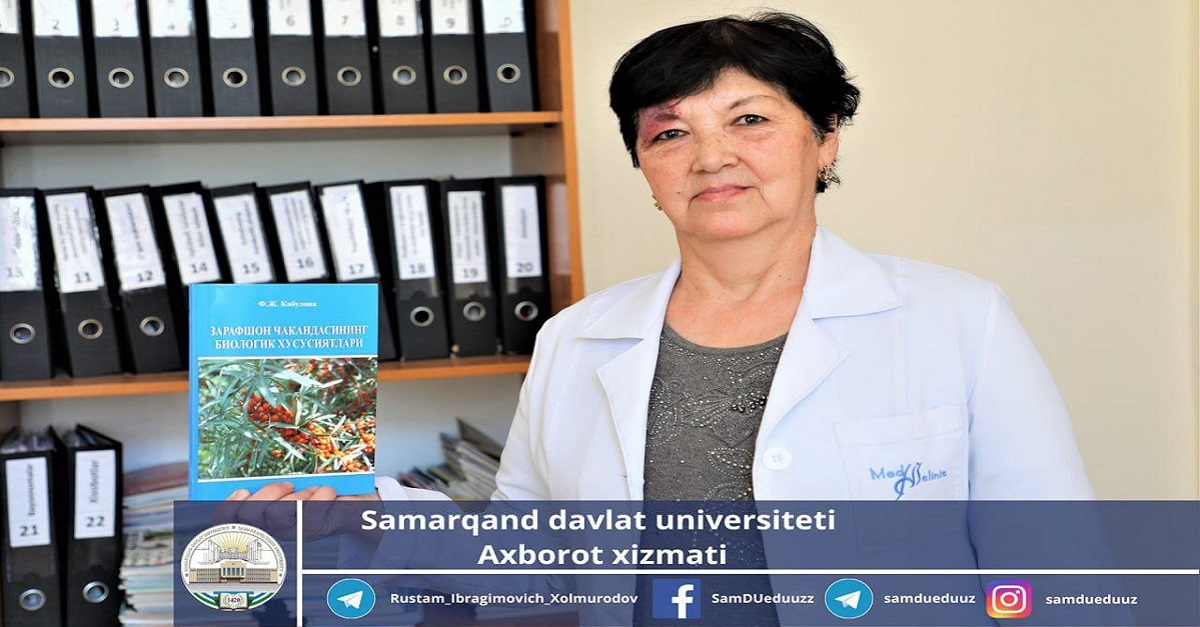"Biology is a science inherited from my father..."

Interview with Flora Kobulova, Associate Professor, Department of Plant Physiology and Microbiology, Samarkand State University
- What prompted you to choose the field of science?
- I was born in a family of scientists. My father, Professor Jabbor Kobulov, was a doctor of biological sciences, a scientist of the Republic of Uzbekistan. More than 50 years he worked at Samarkand State University. My father's contributions to botany are still respected by the entire scientific community. The main direction of scientific research was the study of the biological characteristics of the Central Asian broomrape. One of the many-horned wheat varieties discovered by my father was recognized and included in the list of world wheat varieties.
When I was a child, my father took care of all the flowers, bushes, and various plants that I didn't know the names of. Since then, these plants, which do not look like ordinary seedlings, have seemed very interesting to me. When I grew up, I realized that my father grew various rare medicinal plants in our garden. My father's interest in medicinal plants and green nature in general was passed on to me. Later, this interest led me to the Faculty of Biology of Samarkand State University. So I started studying at the Faculty of Biology. When I was just starting to study, one day my father gave me a book called "Growing Sea Buckthorn in Siberia". The book consists of recommendations on some biological features of sea buckthorn and methods of its cultivation. My father told me that this plant can also be found in the Zeravshan Valley and suggested: "If you are interested, you can conduct scientific research on this as yet unexplored medicinal plant." I read the book with great interest. In this way, I began to study the biological characteristics of sea buckthorn on the territory of the Zeravshan State Reserve. My work, which began initially at the level of a thesis, later expanded and turned into master's and candidate's theses. I completed my Ph.D. thesis on this topic. To date, more than 160 of my scientific papers have been published in domestic and foreign publications.
- Where do you find the strength in yourself to simultaneously engage in science, and home, and family, and children's education, what recommendations can you give in connection with this to teachers and young scientists?
- My husband, Doctor of Biological Sciences, Professor Zafar Ismoilov, has always supported me in my scientific work, because I am a representative of the same field. He tried to create all the conditions for me to do scientific work. He did not put any obstacles for me to go to the reserves for field work, to participate in expeditions. Of course, in this process it is important that the woman herself effectively use the opportunities provided. A person who loves science will always find an opportunity to devote time to it. True, there were moments when I devoted little time to my children. But I tried very hard not to repeat this, learning from my mistakes and shortcomings. I have two children. Now they both have found their place in life. My son studied economics, my daughter studied biology.
- The topics of your main research are related to sea buckthorn. What are the medicinal properties of this plant?
- Sea buckthorn is a widespread plant in the valley of the Zeravshan River in the wild, mainly growing in wet places, along the banks of the river. At the moment, it is protected by the national reserve as a rare plant listed in the Red Book. This plant is widespread in Central Asia, Kyrgyzstan and Tajikistan. There are natural gardens in the Samarkand region, mainly along the Zeravshan River. Considering the many beneficial aspects of the plant, in recent years there has been a strong focus on increasing small plantings. At the moment, my students and I are conducting research on the micropropagation of sea buckthorn. When propagated by plant seeds and cuttings in the traditional way, varieties grown from them may partially lose their qualities, one or another trait. The microclonal method does not have such problems.
Sea buckthorn contains many useful vitamins and biologically active substances. In particular, provitamin A in it has a positive effect on the development of children. It is also used in the manufacture of drugs against infectious infectious diseases. It also contains substances that slow down human aging and activate cardiac activity. Sea buckthorn oil is obtained from the fruits of sea buckthorn, its leaves have antibacterial properties, the bark of the stem contains serotonin and is used to prevent cancer. Sea buckthorn fruits contain more than 20 vitamins, more than 190 biologically active substances. She does not need a blessed life. Can be grown in places around with water.
-What work is being done today at the Faculty of Biology of Samarkand State University to study the biological properties of medicinal plants?
- A lot of work in this direction is being carried out at the Department of Botany, Plant Physiology and Microbiology of the University. Scientists study the morphobiological properties of a number of medicinal plants and develop new breeding methods. In particular, Jerusalem artichoke, Jerusalem artichoke, ginger and the like.
- If you need to describe life with a drawing, what colors will be in your drawing?
First of all, red. Red is a symbol of victory, beauty, always in the first place.
Taking this opportunity, I want to sincerely congratulate all employees, professors, teachers and students working at Samarkand State University on March 8 - International Women's Day. I wish you all good health, family happiness, prosperity and peace in your work.
Interview by Iroda BEKMURODOVA,
an employee of the Information Service of
Samarkand State University.
Photo by Shavkat AKRAMOV.

